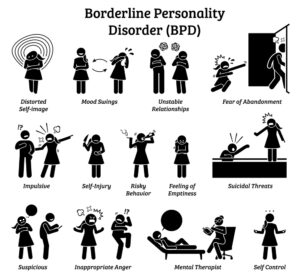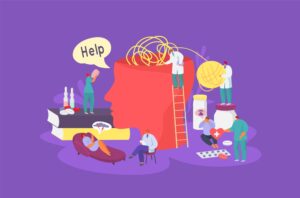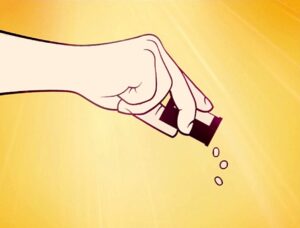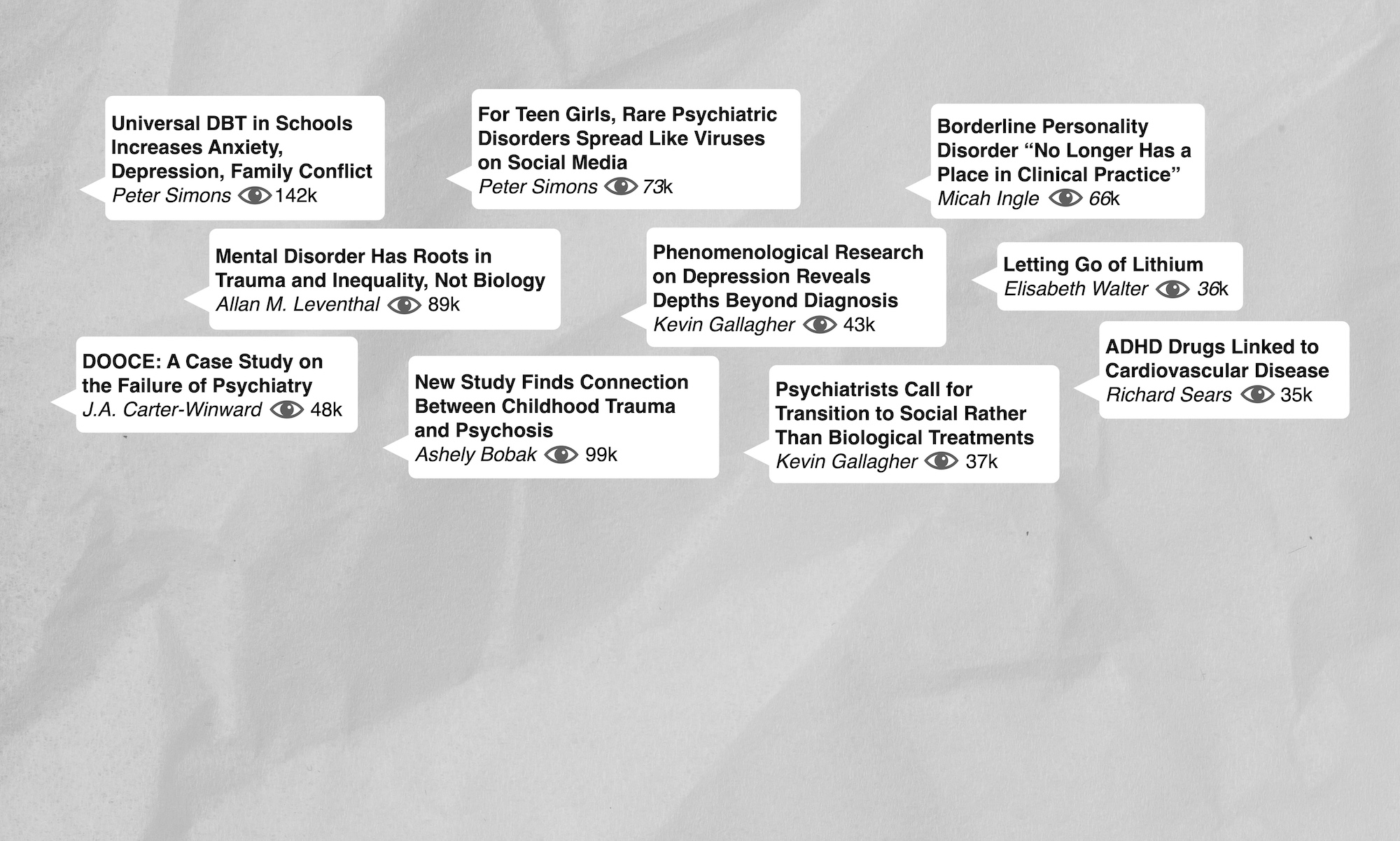Here we highlight the top ten of Mad in America’s most read blogs and personal stories of 2023.
Universal DBT in Schools Increases Anxiety, Depression, Family Conflict

In October, Peter Simons wrote about research asking if dialectical behavior therapy (DBT) can actually make kids’ mental health worse.
In recent years, teaching kids “emotion regulation” has become an increasingly large part of teachers’ responsibilities. Universal social and emotional learning programs (SEL) have become commonplace. However, a new study based on dialectical behavior therapy (DBT) finds that the intervention can actually make kids’ mental health worse. Kids became more anxious and depressed after receiving it and had more conflict with their parents.
New Study Finds Connection Between Childhood Trauma and Psychosis

In December, Ashley Bobak wrote about a new study which sheds new light on the profound impact of childhood trauma in the development of psychotic symptoms, particularly in treatment-resistant cases of schizophrenia.
The relationship between childhood trauma and later development of psychotic symptoms has received increasing attention in recent years. A new study published in Schizophrenia Bulletin Open examines this relationship further, specifically looking at cases of schizophrenia that are treatment-resistant. The authors found a correlation between childhood adversity and psychotic symptoms, especially hallucinations. They recommend that treatment for psychosis, which traditionally has avoided trauma-related work, incorporate approaches that directly address traumatic experiences.
The authors, led by Robert Dudley of the Early Intervention Psychosis Service, NHS Foundation Trust, and University of York, write:
“Early adversity such as childhood neglect (CN) or abuse is associated with an increased risk of a range of mental health issues including psychosis… early adversity was strongly associated with increased risk for psychosis and that people with schizophrenia are 2.72 times more likely to have experienced adverse childhood events than healthy individuals. Evidence supports a causal role as longitudinal studies indicate early adversity precedes the onset of psychosis.”
Mental Disorder Has Roots in Trauma and Inequality, Not Biology
Allan M. Leventhal, PhD, is the author of Grifting Depression: Psychiatry’s Failure as a Medical Science. In December 2023 he wrote:
Despite the compelling evidence that favors a social/psychological, not a biological/medical approach to understanding and treating mental disorder, the prescription of psychiatric drugs remains psychiatry’s treatment of choice. Mental disorder continues to be viewed by psychiatry, the drug companies, other medical practitioners, the media, and the public as being of biological origin. And in full conformity with this scientifically unsupported belief, the NIMH invests relatively few of its research dollars on studies to expand our knowledge of the psychological causation of mental disorder, instead spending heavily on biological research, which continues to produce very little of value. There is no mystery as to why NIMH’s medical bias is failing to advance mental health care.
For Teen Girls, Rare Psychiatric Disorders Spread Like Viruses on Social Media
Writing in November, Peter Simons covered the paper “Social Media as an Incubator of Personality and Behavioral Ppsychopathology: Symptom and Disorder Authenticity or Psychosomatic Social Contagion?”
Researchers argue that a massive sudden spread of unusual psychiatric problems follows the pattern of “psychosomatic social contagion.”
TikTok’s “sick-role subculture” leads to children taking on the characteristics of rare psychiatric diagnoses, according to an article in Comprehensive Psychiatry. Kids—especially teenage girls—are presenting with self-described Tourette’s, eating disorders, autism, and dissociative identity disorder (DID)—but suddenly, and in a way that doesn’t match how these diagnoses have previously been identified.
According to the researchers, identifying with and glamorizing rare disorders has become a way for teenage girls to express extreme negative emotions in a way that, rather than stigmatizing them, makes them feel part of a community and even feel unique and special. The researchers call it “psychosomatic social contagion.”
They write that the purpose “is to seek affirmation and/or draw attention to oneself to acquire social capital in online communities while simultaneously maintaining an unconventional peri-psychiatric identity that may mask feelings of anxiety, depression, and possibly lower self-esteem.”
Borderline Personality Disorder “No Longer Has a Place in Clinical Practice”

In June, Micah Ingle wrote that researchers from the UK and New Zealand argue that Borderline Personality Disorder should be abandoned as a diagnostic category.
Borderline Personality Disorder (BPD) is a diagnostic category in the DSM-V and ICD-10/11 that has faced constant criticism from various sectors. Critics argue that the term does more harm than good due to the stigma associated with the label and the way it pathologizes responses to trauma.
Researchers have also questioned the scientific validity of BPD since it shares significant overlap with other diagnostic categories. Many suggest that it is time to retire this label.
In a new article, psychiatrists Roger Mulder and Peter Tyrer present a well-informed case against the scientific validity of BPD and highlight the confusion it causes researchers and the clinical harm it causes service users.
“Twenty years ago, George Vaillant, in a paper titled ‘The Beginning of Wisdom is Never Calling a Patient a Borderline,’ noted that the diagnosis of borderline often reflects the clinician’s emotional state rather than careful assessment,” the authors write. “This was not an isolated opinion, but we argue that little has changed, and borderline, in the context of personality, has now become a detrimental term hindering progress in research and treatment.”
DOOCE: A Case Study on the Failure of Psychiatry

In May 2023, J.A. Carter-Winward wrote about Heather Armstrong, who rose to fame as a Utah-based “mommy” blogger who wrote about parenting, life, and depression.
The tragedy of Heather Armstrong’s death is that no one really knows why she took her own life, but I believe I do, and the drug manufacturers agree with me. The same medications were given to me to create “hope,” but, instead, they perched me on that precarious “suicide” ledge more often than I care to remember. Armstrong’s book, The Valedictorian of Being Dead, stands, not as a postscript of the power of emotional states, but as a posthumous testimony of the total failure of American psychiatry.
Heather Armstrong’s life was taken by psychiatry, our society’s blind and mindless capitulation to psychiatry, and our unwillingness to scrutinize their methods of madness, which lead to worse mental health, worse physical health, worse outcomes, and loss. Tragedy and loss.
Our hearts and condolences go out to Heather’s children, family, and loved ones. My hope is that they learn the truth of why she felt compelled to raise that white flag before anyone else is trapped in the same morass as Heather was—the medicalized model of mental health “care.”
Phenomenological Research on Depression Reveals Depths Beyond Diagnosis
 From December 2023, by Kevin Gallagher.
From December 2023, by Kevin Gallagher.
Researchers challenge the conventional diagnostic frameworks for depression, advocating for a phenomenological approach that delves deeper into the lived experiences of individuals with depression.
A new study reveals reveals the limitations of current diagnostic methods and research approaches for depression.
Researchers Oskar Otto Frohn and Kristian Moltke Martiny from The Enactlab in Copenhagen argue that current methods often overlook the nuanced experiential aspects of depression, which are crucial for understanding and treating this complex experience. They propose that a phenomenological approach, which focuses on the individuals’s subjective experiences, offers a more comprehensive understanding of depression, thereby enhancing both diagnostic accuracy and therapeutic efficacy.
“Fundamental to phenomenological psychopathology is the critique of the dominating biomedical model of psychopathology and its conformity to the method of operationalism,” Frohn and Martiny write.
“The longing for objectivity and reliability seen within operationalism has led to the notion that psychopathological symptoms are explainable in biological terms, and that the field of psychopathology is therefore reducible to the field of biomedicine… Criticism of the reductionistic and objectivistic tendencies seen in operationalism indicates that a reformation in the field of psychopathology should include more nuanced understanding of psychopathological symptoms by including the subjective experience of mental disorders.”
Psychiatrists Call for Transition to Social Rather Than Biological Treatments
 Also from December 2023, by Kevin Gallagher.
Also from December 2023, by Kevin Gallagher.
“Something is wrong with American psychiatry.”
With that statement, Helena Hansen, Kevin J. Gutierrez, and Saudi Garcia opened their recent article, “Rethinking Psychiatry: Solutions for a Sociogenic Crisis,” recently published in the journal Daedalus. Their work highlights the theories of Frantz Fanon, who believed psychiatric disorders had a social etiology (cause) and, therefore, the solutions to psychiatric suffering must be social in nature as well.
Letting Go of Lithium
 In November, Elisabeth Walter wrote about her journey off lithium.
In November, Elisabeth Walter wrote about her journey off lithium.
“I never wanted to take psych drugs. I took them because I was desperate to get out of pain, but not the kind of pain most people associate with psych meds. I had headaches, brain fog, and fatigue. I developed asthma and chronic sinus infections. I visited doctor after doctor until I eventually met with a neurologist. Being a brain doctor, he focused on the headaches. Without a diagnosis, he suggested Paxil, considering I was 17 and that I felt sad sometimes. My sister took antidepressants and my family has a lot of mental health issues, so based on that, I was thrown into the same category.
I took the drug as prescribed and felt amazing. I had more confidence, more energy, and I felt like I was on top of the world within two weeks. I started talking fast, coming up with ideas and creative projects and I stopped sleeping. Everything felt good and connected, and I had theories about the world I never could have come up with otherwise. I felt like I had taken a magical pill to cure whatever might have been wrong with me… until I crashed, became paranoid and landed in the hospital.”
ADHD Drugs Linked to Cardiovascular Disease
 In October, Richard Sears wrote about a new study published in JAMA Psychiatry finding that long-term use of ADHD drugs is linked to an increased risk of cardiovascular disease.
In October, Richard Sears wrote about a new study published in JAMA Psychiatry finding that long-term use of ADHD drugs is linked to an increased risk of cardiovascular disease.
According to the current research, led by Le Zhang of the Karolinska Institutet in Sweden, service users are at a 4% greater risk of cardiovascular disease (CVD) for each year of ADHD drug use. The largest increase in risk for cardiovascular disease occurs in the first three years of ADHD drug use. Children and adults see a similar pattern of risk when these drugs are used long-term. The authors write:
“This large, nested case-control study found an increased risk of incident CVD associated with long-term ADHD medication use, and the risk increased with increasing duration of ADHD medication use. This association was statistically significant both for children and youth and for adults, as well as for females and males. The primary contributors to the association between long-term ADHD medication use and CVD risk was an increased risk of hypertension and arterial disease. Increased risk was also associated with stimulant medication use.”


















So much great and helpful information. I hope more people will be reading MIA in 2024. Great work, everyone!
Report comment
Well said, Ann! I second it!
Report comment
It is remarkable to me that out of the 10 top articles 3-4 refers to minors. Specifically.
When I was a young folk, putting younger people “ahead of the cart” would have been at least “naive”. 🙂
There were no human rights, no dominance/preponderance of minors rights, no protection for mothers victims of domestic abuse. No consideration of the needs, rights, wants, needs, let alone value and wisdom, of those that because of age, were “put” aside.
Not enough consideration for minors who had to run away from their homes because of family abuse. I saw dozens of minors living on the street “sniffing” glue and solvents to “ease the pain”. Even though they were tougher than some of us who had “homes” we didn’t had to “run” from.
Even if one time, I had to call the police on my father, without shoes, running on the street, hoping the police were there, to answer MY call. Just that one time. I couldn’t call 911, I had to run to the local police station, in the middle of the night.
No protection and recognition of the rights of LGBTQ+. As a priest said: “You were born male or female, and that was it”. And he didn’t meant it in a bad way, years ago…
Being “gifted” was seeing as an obligation, a “privilege”, and not as a disadvantage in some cases, as it is now.
In a mixed sort of way, it makes me somewhat happy, that the community sees, fights, argues about the current, let alone future situation of those who will be left here after we are gone. That didn’t happen often enough back then.
No one came to comfort me, even from my own family when I did that…
Times have changed, and I am happy for that. For some of us, gone, and still here, it would have being motive of that, I think, we really didn’t talk about. How could we?.
We, as MIA and it’s community, didn’t fight, and then some, in vain. I can see just on the interest of “newer” generations.
It might seem small given the “problems” ahead, but, taking literary license, we did tried the best we could. We still do…
Without me taking credit for ALL of that, just, I did try, I am sorry if I couldn’t do better…
Thanks, I didn’t thought I would live long enough to see that: 30-40% of the things people care the MOST, refers specifically to the younger generations. Without the distinctions, like having no shoes, had then,and then some…
I am gratefull for that. And I wish, regardless of the outcome, that you, the younger generations have the best.
Your really deserve it.
As I said every time I could, you are and will…be…better than us.
There will be no other way, regardless of the outcome, I hope you know you will be, you will be…
Report comment
I am still schizophrenic. I live with my schitzophrenia every day, since over twenty years ago. I have no wish to change the name schizophrenia into someone else’s idea of a name for my suffering. I do see what I have as being a distinct category of illness. I believe it is caused by my brain having supersensitivity. I will listen to people who have direct lived experience of chronic schizophrenia. Anyone else might not know what they are talking about, in my opinion. I would be saying this if I had anorexia or brain cancer. Having an opinion on someone else’s suffering is not the same as having actually experienced hourly hallucinations all day and night for decades.
Luckily, my schizophrenia comes into a brain that does prophecy. I have heard through voices that The Hoover Dam is going to be broken by explosion. When that occurs it is time to read my other prophecies. People need to prepare for a massive tsunami that will sweep all over the globe. A regime is coming that will bring forth a Hitler-type of dominant world tyrant and a style of collective tunnel vision and a religion all merged into one. But after such changes are worked through the future will get rid of such tyrany. The future will be good again…one day…just got to survive the rough changes till then.
Apologies for my cheeky schizophrenia standpoint. I celebrate everyone being allowed their difference.
Report comment
You call yourself schizophrenic because you’ve never had it misused against you. You’re lucky. Totally understand the fact that the chronic hallucinations you experience are torture. So are chronic obsessive-compulsive symptoms, hoarding (for others around them), crippling depression etc.
Since you’ve dealt with hallucinations for 2 decades now, it’s possible you’ll experience them for a long time. A psychiatrist once stated to me though that the “natural remission rate for those with “schizophrenia” is about 30%” (and yes, I will call it “schizophrenia” even if you want to call it your schizophrenia). If it’s true, I hope you eventually end up in the 30% and not the 70%.
Best wishes.
Report comment
Kind one, if you do not actually have schizophrenia then I am never going to be quite as interested in your comments from your experiences unless you do have actual schizophrenia.
Report comment
Most people here do not have whatever specific issue you have. Not the commenters nor the article writers. They have their own issues which can be just as painful as yours. Yet you choose to engage with content they put out, you still respond to them telling them “do not define my suffering” because you’re obviously interested in the fact that you think they’re doing that.
If the only people you want to listen to are people who experience hallucinations everyday like you do, why even be on a website that has a majority which does not have that specific issue? You should keep yourself to websites that have an entire population of only people who experience hallucinations everyday and not bother about or engage with what the rest of humanity thinks or writes (including whichever psychiatrist writes your prescriptions because he/she doesn’t likely have your issue either).
Report comment
Registeredforthissite,
Let me ask a question.
Are you telling this poor schizophrenic to go away? I thought this website is for ALL people in the world who experience colourful mental suffering. Will the world’s Soteria houses have a poster on the door saying open to ALL those who are not hallucinating schizophrenics who think a bit differently?
“Do not define my suffering” should be the logo on Soteria houses doors and perhaps it could be the logo of this website.
If, to quote you, the majority of people on this website do not have my specific issue why do they lambast aspects of my specific illness? A condition they admit to having little or even zero lived experience of?
Report comment
Your psychiatrist has zero lived experience of your issue either. Why listen to what he/she has to say? You said it yourself: if one has not gone through what issue you have, you don’t care about what they have to say.
Which aspect of your specific illness does who lambast? And why do you care since you have no interest in reading comments written by people who haven’t been through the exact same thing you have? Even two people categorised with “schizophrenia” do not have the same suffering. You might visually hallucinate bugs crawling on your skin. Someone else might hear the TV talking to them. Both your reasons for experiencing that might also be different.
I didn’t tell you to go away. I asked you why you’re here since you are uninterested about what people have to say if they haven’t been through the exact same thing you have.
Again, what aspects of your specific illness do people lambast?
Report comment
I am not going to fall for it anymore. The way any comments section becomes a kind of logic trap. A set up where two opponents slug it out in the “reasoning” game. Presumably I am supposed to get stuck into your intolerable misery and you are supposed to get stuck into my intolerable misery. I am to say my suffering is worse and you are to say your suffering is worse. Who is it for? The off camera heckling crowds? Are they picking their favourite.
It would not be like this if we were sitting in a flower meadow face to face. There would only be you and me. You could talk more about your OCD and I could talk more about my hallucinations, or maybe we would be talking about something else, butterflies, loved music, your talents, my talents, your yearning, my yearning.
A comment section anywhere is an instant arena. An artificial podium lit stadium filled with the jeering of thousands if you say something wrong or if I say something wrong. For that reason it becomes more embarrassing to leave a riposte unsaid. A stadium brings more of a challenge to look like a winner not a shamed loser. The setup only deals in argy bargy bickering and not inclusion. The trade is inherently loveless.
I could come back with winning lines, criticism of bits of logic with yet more logic. But I prefer to be a creature of feeling and sit in a real meadow of flowers with you as my friend.
I am sorry.
Report comment
I have no problem exchanging info about whatever I have gone through or am going through. If people say hallucinations cannot be chronic or are non-existent, they are wrong. But you’re also on a website where people have faced serious damages because of psychiatric categorisations because there is a large distance between what their truth is and what has been forcibly stamped on them and it has caused them serious problems. So many articles have been written on it. The internet is replete with people making colourful videos on social media explaining all kinds of “personality disorders”, “mood disorders” and all sorts of other things with barely space for the practical aspects of what such terms do to people or their pitfalls. You will not face any resistance on the myriad of majority psychiatric sites, the 100s of comment sections on YouTube videos or almost any other majority space out there.
Like I said earlier, you have no problem with the term schizophrenia because you’re lucky enough to be surrounded by people who haven’t misused it, it is congruent with whatever your suffering is and you have no problem with the role of someone termed as a schizophrenic. It often doesn’t end with schizophrenia. The longer people spend in the psych system, the more terms get added onto them. The social impact, the legal impact, the medical impact of those terms can be devastating on people’s lives. You also end up inadvertently dragging the problems of one person onto another because they are termed the same when their truth is not the same.
For example, people will talk about “bipolar disorder”. Almost no one talks about the fact that psychiatric drug induced mania causes people to be termed that way. It’s a nasty practice in psychiatry that has caused so many people problems. What then comes with that? People assuming they’re psychotic, people assuming they go up and down, people giving them examples of “successful people with bipolar disorder” which it is not their truth and is nothing but damaging to them.
Similarly, you don’t want people to define your suffering, but the psychiatrist who writes your prescriptions regularly does that. Individuals such as yourself who are happy to call themselves schizophrenics just reinforce all of this. I see a lot of your comments and none of them are specific. They are verbose and flowery. You don’t say what your suffering specifically is and what it is that you want. From what I’ve gotten though, you want people to accept the fact that the chronic hallucinations you face are real, wishing them away won’t make them go away, the pills help you and you don’t like it when people criticise the drugs that work for you and stuff like that. Most people will do all that anyway. Almost every psychiatrist you go to will accept your conditions. The real world is on your side.
Report comment
I am MAD. It causes me to believe all kinds of things. I cannot help it. It is caused by a chemical.
Report comment
Like I said, almost every psychiatrist will see things the way you see them and accept your conditions. He will gladly put the term “schizophrenia” on your file and proceed to prescribe the drugs you want (olanzapine or risperidone or whatever). He will agree that you have a brain based, neutransmitter related condition with genetic factors associated with it. What you want and how you want others to perceive your problems is the general standard almost everywhere.
Report comment
This is such a lovely reply Diaphanous. Thank you. I hope to meet you one day in a field to discuss the butterflies and song birds in the trees.
Report comment